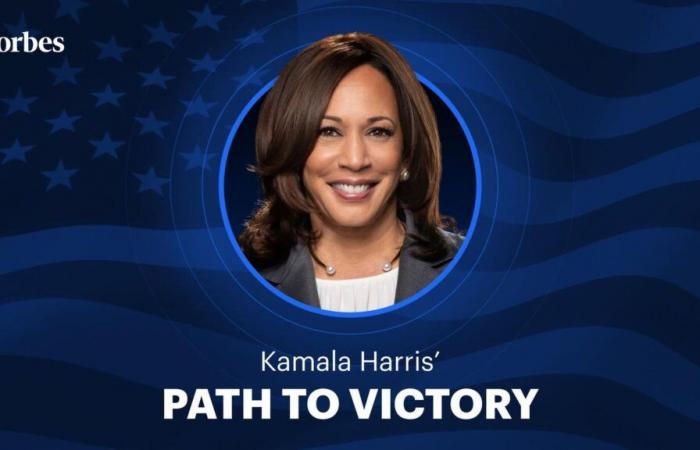Topline
Former President Donald Trump carved out an election night lead over Vice President Kamala Harris after winning Georgia and North Carolina, and he’s ahead in five other battlegrounds just after polls closed—leaving Harris with only a slim path to 270 electoral votes.
Jamel Toppin for Forbes
Jamel Toppin for Forbes
Key Facts
Trump’s wins in North Carolina and Georgia, according to The Associated Press’ race calls, brought his electoral vote count total to 247, while Harris had won 210 and trailed Trump in vote-counting for five other battlegrounds that remain too close to call.
The losses in the two Southeastern battlegrounds significantly narrow Harris’ paths to victory, making her more reliant on the three “blue wall” states: Pennsylvania, Wisconsin and Michigan.
Harris will still hit exactly 270 electoral votes if she wins all three of those northern swing states, plus all of the other non-swing states President Joe Biden won in 2020—though she currently trails in all three.
Pennsylvania is now a must-win for Harris, as a Trump victory there (along with wins in the other non-swing states he won in 2020) would put him at 270 electoral votes.
The vice president could theoretically win if she secured Pennsylvania, Arizona and Michigan (allowing her to lose Wisconsin), or she could win through Pennsylvania, Wisconsin, Arizona and Nevada (while losing Michigan)—though those are less likely.
Key Background
If elected, Harris would be the first woman and first person of South Asian descent elected to the White House, after a whirlwind campaign in which she was elevated to the top of the ticket to replace Biden after he decisively won the Democratic primaries in every state and dropped out of the race. Harris’ entrance into the contest marked a reunification of her party, after Biden’s resistance to bow out of the race—even as Trump surged ahead in polls—exposed deep divisions within the party. Democrats quickly coalesced around Harris, hours after Biden announced his historic decision to step aside on July 21, less than a month after his consequential June 27 debate with Trump. Harris tapped Minnesota Gov. Tim Walz as her running mate two weeks before the Democratic National Convention. She enjoyed a brief honeymoon period in polls and was widely viewed as the winner of her first and only debate with Trump on Sept. 10, but Trump has narrowed the polling gap, and the two were nearly tied nationally and in every battleground headed into Election Day. Harris, 60, the daughter of a South Indian mother, an acclaimed breast cancer researcher, and a Black father, a renowned economist, was born in Oakland, attended Howard University for undergrad and received her law degree from the University of California Hastings. She was elected San Francisco attorney general in 2004 and became the first Black person, first woman and first Asian American to serve as California attorney general in 2011. She was elected to the Senate in 2016 and ran for president in 2019.
Tangent
Harris has largely centered her campaign around criticizing Trump and her warnings of the dangers she says he poses if re-elected. She has called him a “fascist,” has teamed with prominent anti-Trump Republicans, including former Rep. Liz Cheney, R-Wyo., to campaign against him, and has repeatedly highlighted his promise to seek retribution against his political adversaries, which he recently referred to as the “enemy from within.” In her truncated campaign timeline, some of Harris’ policy proposals have been light on details and she has faced the difficult task of differentiating herself from Biden, without fueling criticism of his administration. Harris has also walked back—or been silent—on some of her previous, more progressive policy proposals, including a federal fracking ban and decriminalizing illegal border crossings (both of which she said she no longer supports). She and her campaign have refused to definitively say if she is still in favor of other policies she once endorsed, including decriminalizing prostitution and slavery reparations for Black Americans. Harris has promised to deploy economic policies to boost the middle class if elected, including not raising taxes on Americans making $400,000 or less, a federal ban on price gouging and no taxes on tips. She’s also vowed to expand the child tax credit for lower- and middle-class families and wants to provide a $25,000 down payment assistance for first-time home buyers.
Chief Critic
Trump has cast Harris as a puppet of the Biden administration and the Democratic Party and accused her of inauthenticity, coining the nickname “lyin’ Kamala” for the vice president. Trump has suggested, without evidence, that Harris fabricated her college summer job at McDonald’s and has even questioned her race. In one of his more incendiary attacks against Harris during the campaign cycle, Trump suggested Harris “became” Black, though she has spoken about her biracial heritage repeatedly throughout her decades-long political career. He has also blamed her for the surge in illegal border crossings during Biden’s administration and record-high inflation rates last summer (which has since leveled off), and attacked her intelligence, repeatedly claiming she has a “low IQ,” is “lazy” and “slow.”
Further Reading
Trump Vs. Harris 2024 Polls: Harris Up By Razor-Thin 1 Point In Final Forbes/HarrisX Survey (Forbes)
Election 2024 Swing State Polls: Near-Tie In ‘Blue Wall’ As Trump And Harris Fight For Pennsylvania (Latest Update) (Forbes)
Can Trump And Harris Tie In Tomorrow’s Election? It’s Possible—Here’s What Would Happen (Forbes)
‘Blue Mirage’ And ‘Red Mirage,’ Explained: Why Tomorrow’s First Swing State Vote Counts May Be Misleading (Forbes)
Here’s When We’ll Know The Trump-Harris Election Results In Must-Win Swing States (Forbes)






